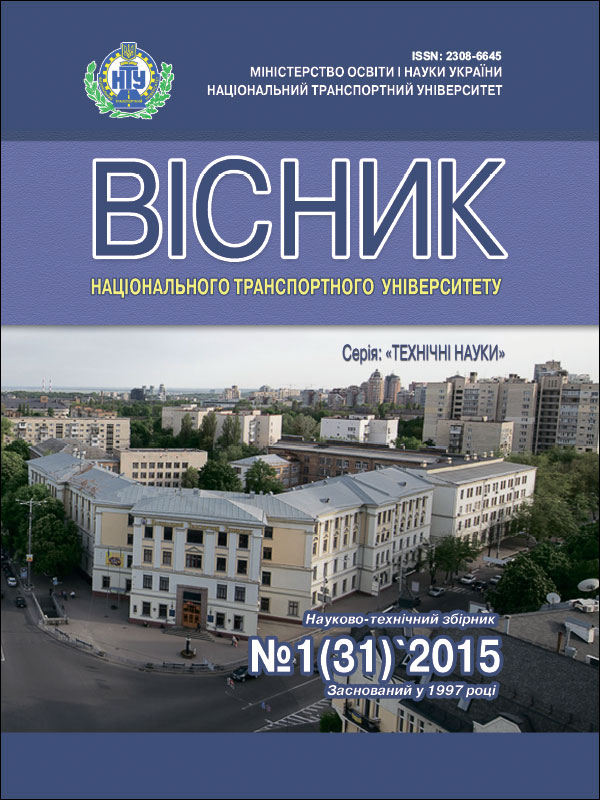MANAGEMENT OF CUSTOMER VALUE TRAJECTORY CREATION IN SERVICE PROCESS
ABSTRACT
Bakalinsky O. V. Management of customer value trajectory сreation in service process. Visnyk of the National Transport University. Series «Economic sciences». Scientific and Technical Collection. - K.: NTU, 2021. - Issue 2 (49).
The aim of the study - development and testing of marketing tools that allow to analyze the trajectory of creation of clients attitude to the service, the results of its application are clear and understandable to the management of the service provider, and the conclusions from analysis of trajectory are more fully than known approaches can rationalize the management of elements of customer service value.
Methods - passenger survey, measuring the consumer value of trips by public transport based on Likert scale, measuring the level of passenger satisfaction with public transport service based on semantic differential, development of cascade charts of trajectory of customer value of passenger transportation service.
Results. When interacting with the market, rational management of the customer service value is an important factor of goals achieving by service provider. Customer service value is the client's feeling of the difference between the benefits and the sacrifices gained in the process and the outcome of the service. To improve service, the provider usually measures the client's perception of the service process at its some control points and (or) by specific elements of its customer value. Measurements of custormer service value are made in the form of client's attitude using various ordinal scales. At this case the client's attitude is a static indicator. The service provider often has no idea about the path of client's consciousness changed before measuring the customer service value. But the final measured level of customer service value depends on trajectory of forming the clien's attitude, so this information should be useful to manager. It can contribute to the further rationalization of managerial decisions aimed to improve the service. Based an example of public passenger transportation in city Kyiv shows how manager can uses the waterfall chart of customer value formation at managerial decisions to improve service.
KEYWORDS: SERVICE MARKETING, CUSTOMER SERVICE VALUE, TRAJECTORY OF ATTITUDE CREATION, SERVICE PROCESS, MANAGERIAL DECISIONS
REFERENCES
- Bakalinsky O. V. (2012). Marketynhove zabezpechennya vprovadzhennya perspektyvnykh vydiv zaliznychnoho rukhomoho skladu [Marketing support for implementation of prospective types of railway rolling stock] DETUT, Kyiv. - 268 p. [in Ukrainian].
- Bakalinsky O. V. (2017). Total'ne upravlinnya spozhyvchoyu tsinnistyu posluhy. Nova kontseptsiya, yaka rozshyryuye praktychni mozhlyvosti marketynhu servisu [Total management of the customer service value. A new concept that expands capabilities of the service marketing] . - K: DUIT. - 140 p. [in Ukrainian].
- Vuchic, R. Vukan. (2011). Transport v gorodah, udobnyh dlia zhizni [Transportation for Livable Cities] Moscow: Publishing House «The Territory of the Future», 576 p. [in Russian].
- Anderson James C., Dipak C. Jain, Pradeep K. Chintagunta. (1993). Customer Value Assessment in Business Markets: A State-of-Practice Study // Journal of Business to Business Marketing.- Vol. 1, pp. 3-30.
- Bakalinsky Oleksandr, Kulbovskyi Ivan, , Sorochynska Olena, Kharuta Vitalii, Holub Halyna, Skok Pavel (2019). Implementation of innovative technology for evaluating high-speed rail passenger transportation // Physics and Engineering, EUREKA.- Number 6, Pp. 63-72 .
- Bolton R. N., Drew J. H. (1991). A Multistage Model of Customers' Assessments of Service Quality and Value // Journal of Consumer Research.-17(4), рр.
- Husserl E. (1983). Ideas for pure phenomenology and phenomenological philosophy. Hague: Martinus Nijhojf.
- Cronin J.J., Brady M.K., Hult G.T.M. (2000). Assessment the Effects of Quality, Value, and Customer Satisfaction оп Consumer Behavioral Intentions in Service Environments // Journal of Retailing.- Vol. 76, No. 2, pp. 193-218.
- Ethan M. Rasiel. (1999). The McKinsey Way / McGraw-Hill.
- Flint D. J., Blocker C. P., & Boutin, P. J. (1994). Customer value anticipation, customer satisfaction and loyalty: An empirical examination // Industrial Marketing Management.- 40(2), 2011, pp. 219-230.
- Gale Bradley T. (1994). Managing Customer Value / New York: Free Press.
- Haemoon Oh, Kawon Kim. (2009). Customer satisfaction, service quality, and customer value: years 2000-2015 // International Journal of Contemporary Hospitality Management.- Vol. 29, Issue: 1, 2017, pp. 2-29.
- Kuo Y.-F., Wu C.-M., Deng W.-J. (2009). The relationships among service quality, perceived value, customer satisfaction, and post-purchase intention in mobile value-added services // Computers in Human Behavior.- 25(4), pp. 887-896.
- Likert R. (1932). A Technique for the Measurement of Attitudes // Archives of Psychology. - № 140, pp. 1-55.
- Monroe Kent B. (1990). Pricing: Making Profitable Decisions / New York: McGraw-Hill.
- Parasuraman А. (1997). Reflections on Gaining Competitive Advantage Through Customer Value // Journal of the Academy of Marketing Science.- Vol. 25, No. 2, pp. 154-161.
- Robert B. (1997). Customer Value: The Next Source for Competitive Advantage // Woodruff Journal of the Academy of Marketing Science.- Volume 25, No. 2, pp. 139-153.
- Stanley F. Slater. (1997). Developing a Customer Value-Based Theory of the Firm // Academy of Marketing Science, Journal.- Spring 25(2), pp. 162-167.
- Zeithaml Valarie A. (1988). Consumer Perceptions of Price, Quality, and Value: A Means-End Model and Synthesis of Evidence // Journal of Marketing.-Volume 52, July, pp. 2-22.
- Wang Y., Lo H., Yang Y. (2004). An Integrated Framework for Service Quality, Customer Value, Satisfaction: Evidence from China's Telecommunication Industry / Information Systems Frontiers 6(4), pp. 325-340.
AUTHOR
Bakalinsky Oleksandr V., Doctor of Economics, professor, National Transport University, professor department of management, e-mail: anticrisiscrew@gmail.com, tel. +38 050 351 25 10, Україна, 01010, Kyiv, Omelyanovycha-Pavlenka Str., 1, r. 243, orcid.org/0000-0003-1215-7470.
REVIEWER
Melnyk T. S., Doctor of Economics, JSC Ukrzaliznytsia, Kyiv, Ukraine.
Vorkut T. A. Doctor of Tech Sci, professor, National Transport University, Kyiv, Ukraine.
Article language: Ukrainian
Open Access: http://publications.ntu.edu.ua/visnyk/49/003-014.pdf
Print date: 15.03.2021
Online publication date: 05.04.2021
